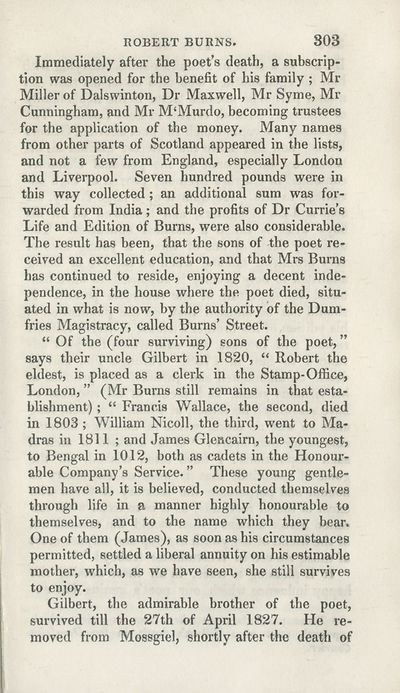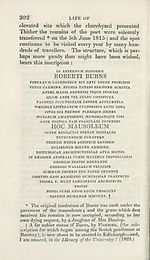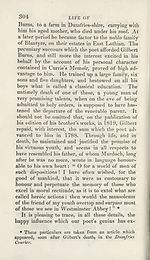Scotland/Scots > Life of Robert Burns
(313)
Download files
Complete book:
Individual page:
Thumbnail gallery: Grid view | List view

ROBERT BURNS. 803
Immediately after the poet’s death, a subscrip¬
tion was opened for the benefit of his family ; Mr
Miller of Dalswinton, Dr Maxwell, Mr Syme, Mr
Cunningham, and Mr M'Murdo, becoming trustees
for the application of the money. Many names
from other parts of Scotland appeared in the lists,
and not a few from England, especially London
and Liverpool. Seven hundred pounds were in
this way collected; an additional sum was for¬
warded from India ; and the profits of Dr Currie’s
Life and Edition of Bums, were also considerable.
The result has been, that the sons of the poet re¬
ceived an excellent education, and that Mrs Burns
has continued to reside, enjoying a decent inde¬
pendence, in the house where the poet died, situ¬
ated in what is now, by the authority of the Dum¬
fries Magistracy, called Burns’ Street.
“ Of the (four surviving) sons of the poet,”
says their uncle Gilbert in 1820, “ Robert the
eldest, is placed as a clerk in the Stamp-Office,
London, ” (Mr Burns still remains in that esta¬
blishment) ; “ Francis Wallace, the second, died
in 1803 ; William Nicoll, the third, went to Ma¬
dras in 1811 ; and James Glencairn, the youngest,
to Bengal in 1012, both as cadets in the Honour¬
able Company’s Service. ” These young gentle¬
men have all, it is believed, conducted themselves
through life in a manner highly honourable to
themselves, and to the name which they bear.
One of them (James), as soon as his circumstances
permitted, settled a liberal annuity on his estimable
mother, which, as we have seen, she still survives
to enjoy.
Gilbert, the admirable brother of the poet,
survived till the 27th of April 1827. He re¬
moved from Mossgiel, shortly after the death of
Immediately after the poet’s death, a subscrip¬
tion was opened for the benefit of his family ; Mr
Miller of Dalswinton, Dr Maxwell, Mr Syme, Mr
Cunningham, and Mr M'Murdo, becoming trustees
for the application of the money. Many names
from other parts of Scotland appeared in the lists,
and not a few from England, especially London
and Liverpool. Seven hundred pounds were in
this way collected; an additional sum was for¬
warded from India ; and the profits of Dr Currie’s
Life and Edition of Bums, were also considerable.
The result has been, that the sons of the poet re¬
ceived an excellent education, and that Mrs Burns
has continued to reside, enjoying a decent inde¬
pendence, in the house where the poet died, situ¬
ated in what is now, by the authority of the Dum¬
fries Magistracy, called Burns’ Street.
“ Of the (four surviving) sons of the poet,”
says their uncle Gilbert in 1820, “ Robert the
eldest, is placed as a clerk in the Stamp-Office,
London, ” (Mr Burns still remains in that esta¬
blishment) ; “ Francis Wallace, the second, died
in 1803 ; William Nicoll, the third, went to Ma¬
dras in 1811 ; and James Glencairn, the youngest,
to Bengal in 1012, both as cadets in the Honour¬
able Company’s Service. ” These young gentle¬
men have all, it is believed, conducted themselves
through life in a manner highly honourable to
themselves, and to the name which they bear.
One of them (James), as soon as his circumstances
permitted, settled a liberal annuity on his estimable
mother, which, as we have seen, she still survives
to enjoy.
Gilbert, the admirable brother of the poet,
survived till the 27th of April 1827. He re¬
moved from Mossgiel, shortly after the death of
Set display mode to:
![]() Universal Viewer |
Universal Viewer | ![]() Mirador |
Large image | Transcription
Mirador |
Large image | Transcription
| Antiquarian books of Scotland > Scotland/Scots > Life of Robert Burns > (313) |
|---|
| Permanent URL | https://digital.nls.uk/108249615 |
|---|
| Description | Thousands of printed books from the Antiquarian Books of Scotland collection which dates from 1641 to the 1980s. The collection consists of 14,800 books which were published in Scotland or have a Scottish connection, e.g. through the author, printer or owner. Subjects covered include sport, education, diseases, adventure, occupations, Jacobites, politics and religion. Among the 29 languages represented are English, Gaelic, Italian, French, Russian and Swedish. |
|---|

